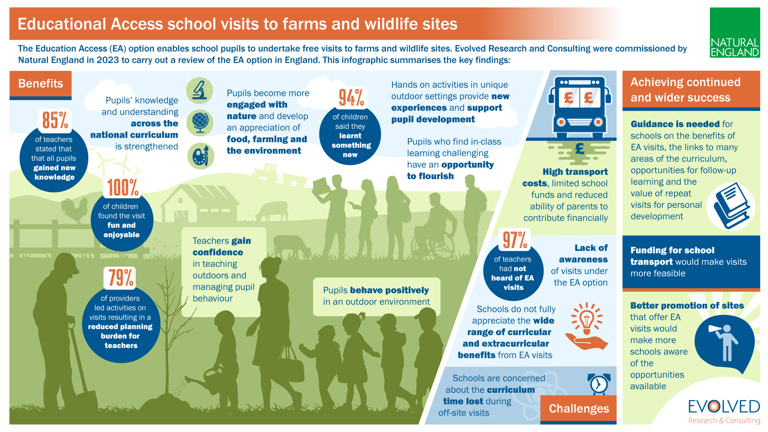
ReNew Forest - Legacy Landscape Partnership Board funding development
Learn More

This research set out to review the current use of the Educational Access (EA) option in England and to develop an evidence-base to better support Educational Access (EA) visits for farm/wildlife site staff, teachers, and pupils across Key Stages (KS) 1-4.
The EA option of Defra’s Countryside Stewardship schemes enables farms or wildlife sites to open their sites to school pupils, with the aim of enabling students to explore ‘the links between farming, conservation and food production, using the land as a classroom’. EA visits for school pupils offer the opportunity to support a range of cross-curricula learning and other extracurricular benefits. However, the benefits to pupils are not being fully maximised and a lack of knowledge of the EA option among schools across the country, as well as the high level of transport costs, means that many pupils do not have the opportunity to experience and benefit from these unique outdoor learning experiences.
ERC were commissioned by Natural England to evaluate the current use of the EA option in England and to explore these issues in greater detail. The research addressed gaps in existing evidence through field observations, surveys and interviews with teachers, and reflective discussions with pupils during farm visits. The resulting recommendations aim to encourage more schools to take up the option of EA visits and to better support teachers in delivering cross curriculum-based activities.
The research found a variety of successful outcomes for pupils and teachers. They provide unique learning spaces, enabling pupils to experience and interpret new learning outside of the classroom, as well as undertaking hands-on, physical activities in an outdoor environment.
A number of challenges means that many pupils do not have the opportunity to experience and benefit from visits under the EA option. Challenges include:
To address these challenges, there is a need to explore opportunities to enable funding for school transport to incentivise schools to visit EA sites. Guidance is needed on the benefits of EA visits, particularly the value of the trip to the curriculum, the opportunities for follow-up curriculum learning, the value of repeat visits, and how it can be positive for pupils’ personal development and wellbeing. Further information is also required on the location of sites and providers that offer EA visits.
The report has now been published and is available here. The following infographic summarises the findings.

Learn More

Learn More

Learn More

Learn More

This project carried out an analysis
of the fishing gear life cycle and the material flow of plastic fishing gear
through the value chain in Sri Lanka and developed a range of outreach
resources to raise awareness.
Learn More